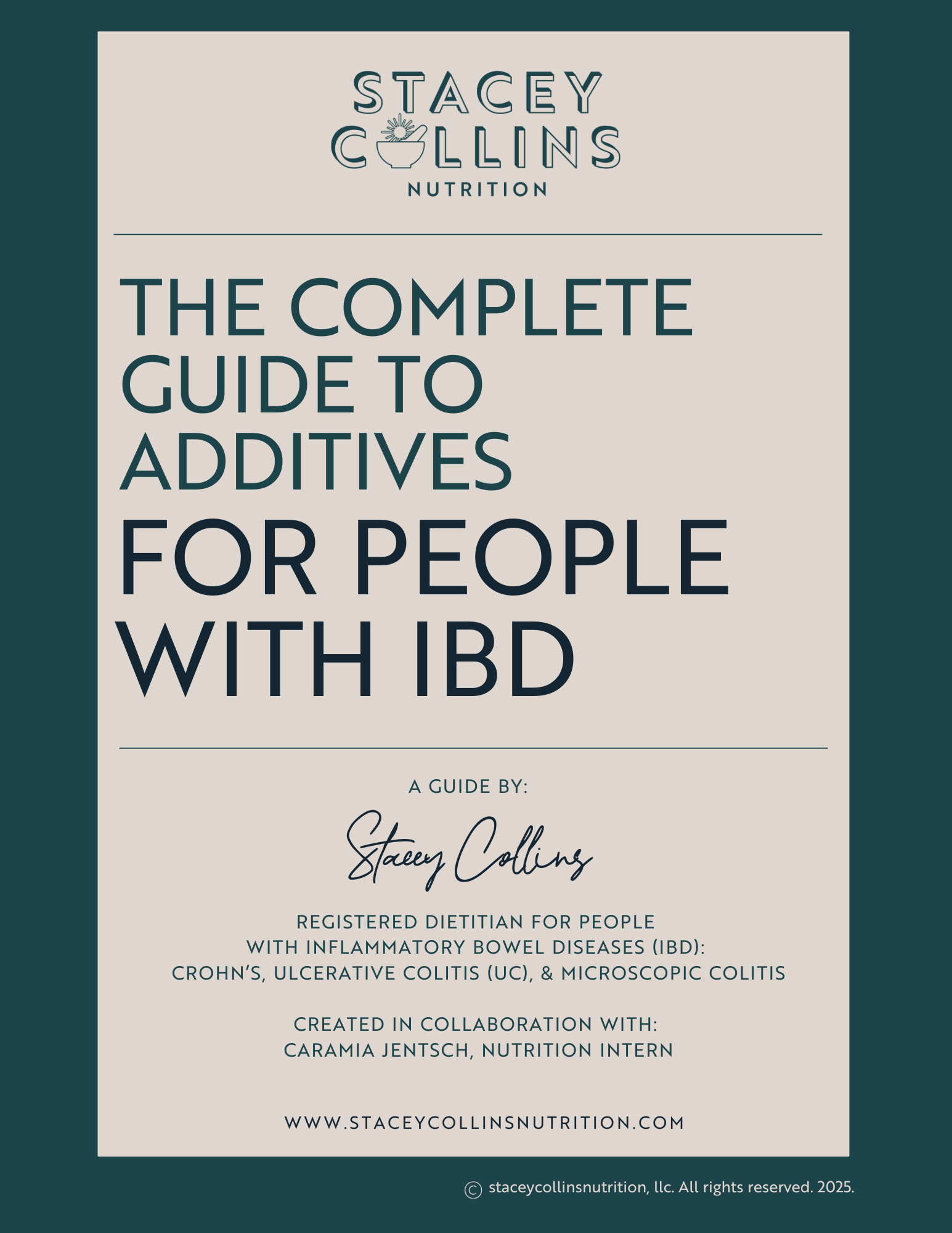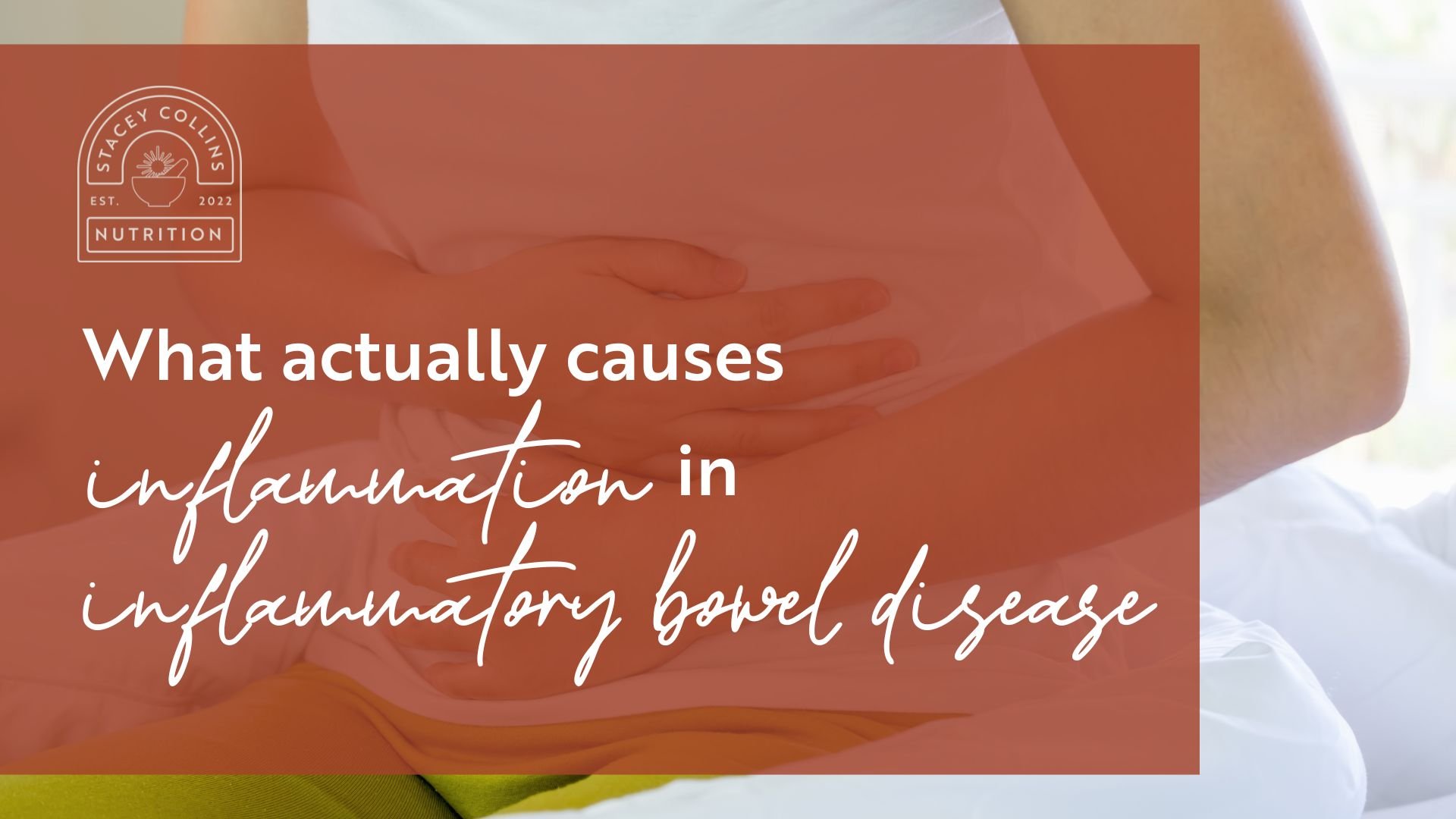What Actually Causes Inflammation in IBD?
If you have Crohn’s Disease or ulcerative colitis, you’ve likely wondered how the food you eat contributes to your symptoms.
As an IBD dietitian, I’m here to help you find science-based answers. But first, let’s get one thing straight: food is just one piece of a much larger puzzle when it comes to inflammatory bowel disease (IBD).
While certain foods can certainly trigger symptoms, they’re often not the root cause of your condition. So please don’t spend your energy blaming yourself or obsessing over every bite you take. Your IBD isn’t your fault.
And if you’re struggling with disordered eating alongside IBD, please prioritize your mental health first. Consider reaching out to an eating disorder specialist who understands IBD, since you deserve support for both conditions.
Here’s what you’ll learn in this blog:
The 5 main ways inflammation happens in your body
How food additives might be affecting your symptoms
A simple chart showing which additives to watch out for.
Want to dive deeper? I’ve also created a comprehensive guide to additives that covers:
Exactly which additives to limit (no more guessing games!)
Why the “if you can’t pronounce it, don’t eat it” rule isn’t always helpful (some hard-to-pronounce ingredients are actually vitamins!)
Where these additives hide in everyday foods, supplements, and sauces
Which additives you don’t need to worry about
Dietitian-approved swaps for common pantry items
Simple recipes your whole family can enjoy

Purchase the Complete Guide to Additives for People with IBD ($15)
This $15 guide helps people with Crohn’s or ulcerative colitis understand how additives can contribute to inflammation. You'll learn which additives to limit and which ones you don't need to worry about.
Ready to separate the facts from the fear-mongering? Let’s start with understanding how inflammation actually works.
What Causes Inflammation in IBD?
Inflammation in inflammatory bowel disease is like a complex domino effect because multiple things can trigger inflammation, and they often work together to keep your symptoms active. Here are five key ways inflammation can happen in your body.
1. Your Immune System Gets Confused (Immune Dysregulation)
Think of your immune system as your body’s fire department. Normally, firefighters rush to put out real fires and then go home when the emergency is over. But with IBD, it’s like having a fire department that sees smoke from a neighbor’s barbecue and treats it like a five-alarm fire.
Your immune system keeps sounding the alarm and sending “firefighters” (immune cells) to fight fires that aren’t actually dangerous, like the helpful bacteria that belong in your gut. Even worse, these immune cells never get the “all clear,” so they keep releasing inflammation long after they shouldn’t.
What’s happening behind the scenes: Your immune cells (called T-helper cells) release inflammatory messengers called cytokines. You might recognize some of these names if you’ve been on certain IBD medications, like TNF-α and IL-6, which are common targets that medicines try to block.
How your doctor might treat this: Biologic medications (like anti-TNF drugs) work by calming down these overactive immune messengers.
2. Your Gut Lining is Leaky (Barrier Dysfunction)
Picture your intestinal lining like the walls of your house. Normally, these walls have tight seals around the windows and doors, letting in what you want (like nutrients from food) while keeping out what you don’t (like harmful bacteria).
With IBD, these seals—called tight junctions—start to break down. It’s like having gaps around your windows that let rain, bugs, and unwanted visitors slip inside your house. When bacteria and other particles leak through your gut lining into places they shouldn’t be, your immune system goes into overdrive.
The terminology you might hear:
Social media influencers often call this “leaky gut”
Scientists and doctors use the term “intestinal permeability”
A word of caution: You’ve probably seen expensive “leaky gut tests” advertised online. Save your money, because most of these tests aren’t reliable. The only accurate way to measure intestinal permeability right now is through specialized research equipment that isn’t available to consumers.
What can make your gut lining more leaky:
Your genetics (some people are naturally more prone to this)
Getting older
Chronic stress
Eating too many highly processed foods
Drinking alcohol
Undernutrition
Overusing NSAIDs (like ibuprofen) or antibiotics
How nutrition can help: Working with an IBD-specialized dietitian can help you create an eating plan that supports your gut lining’s healing process alongside your medical treatment. This approach isn’t about restrictive dieting, but giving your body the right building blocks to repair itself.
3. Your Gut Bacteria Get Out of Balance (Microbiome Imbalance)
Think of your gut microbiome like a thriving garden ecosystem. In a healthy gut, you have hundreds of different types of bacteria living together in harmony. Some help digest food, others produce vitamins, and many keep harmful bacteria in check.
With IBD, this ecosystem gets thrown off balance. It’s like having a garden where the weeds (inflammatory bacteria) start taking over, while the helpful plants (beneficial bacteria) struggle to survive.
What’s happening: You end up with less variety overall and too much of the “bad” bacteria like Enterobacteriaceae, while losing the “good” bacteria like Faecalibacterium prausnitzii that produce butyrate, a compound that feeds and heals your gut lining.
What throws off this balance:
Overusing antibiotics (some can act like weed killer that kills both good and bad bacteria)
Eating a limited, nutrient-poor diet for too long
Here’s the important part: I know IBD symptoms might make you want to restrict more and more foods, but cutting out too many foods actually makes the microbiome problem worse.
The solution? Think like a gardener:
Instead of restricting, focus on feeding your beneficial bacteria with a variety of foods. Think of food as fertilizer for your gut garden. The more diverse your “fertilizer” (different fruits, vegetables, legumes, and whole grains), the more diverse and resilient your bacterial garden becomes.
Key foods that act as fertilizer:
Probiotic foods: These add beneficial bacteria (think fermented foods)
Prebiotic foods: These feed your existing good bacteria (like garlic, onions, bananas, oats)
Colorful plant foods: Each color provides different nutrients for different bacterial species
The research shows that the healthiest microbiomes are the most diverse ones. Work with an IBD-experienced dietitian to create a personalized plan that expands your food variety safely, taking into account your specific symptoms and tolerances.
4. Environmental and Dietary Triggers
Certain foods can directly fuel inflammation in your gut by disrupting your bacterial balance, weakening your gut lining, or setting off immune reactions.
Foods that tend to increase inflammation:
High saturated fat foods: Red meat, processed meats (sausage, deli meats), and deep-fried foods
Certain cooking fats: Coconut oil and butter, when used frequently
Sweetened drinks: Both artificially-sweetened and sugar-sweetened sodas, sports drinks, and fruit juices
Food additives (covered in detail below!)
Ultra-processed foods: Packaged snacks, frozen meals, fast food
Important note: Context is everything.
If you’re relying on ultra-processed foods due to food insecurity, you’re not “doing something wrong.” These foods often exist in our diets because of very real barriers:
Money: Fresh, whole foods can cost more than processed options
Time: Working multiple jobs or caring for family leaves little time for meal prep
Energy: Chronic illness is exhausting, so sometimes a frozen meal is what gets you fed
Knowledge: Reading ingredient labels and understanding nutrition isn’t taught to everyone
Access: Not everyone lives near a well-stocked grocery store or has reliable transportation for food shopping
Safety: Some neighborhoods lack safe places or green spaces to walk or exercise, which can impact your overall health
Another key point to consider is that all forms of alcohol, including that glass of red wine you might’ve heard is “good for you”, can increase gut inflammation when you have IBD.
The takeaway: If you’re able to make changes, focus on small, sustainable swaps rather than dramatic overhauls. If you’re facing barriers that make dietary changes difficult right now, that’s okay, too. Work with what you have, and don’t let perfect be the enemy of good.
Your food choices don’t cause your IBD, and you shouldn’t carry guilt about what you’re able to access or afford.
5. The Gut-Brain Connection
Your gut and brain are in constant conversation through what scientists call the “gut-brain axis.” Think of it like a two-way highway with messages traveling back and forth between your digestive system and your brain.
When you’re dealing with chronic stress, whether from work, relationships, financial pressure, or the stress of managing IBD itself, this communication highway gets disrupted. Your brain sends stress signals that can:
Slow down or speed up digestion (affecting gut motility)
Weaken your immune system’s ability to function properly
Mess with your sleep patterns
Make you more sensitive to pain
It’s a frustrating cycle. IBD symptoms create stress, and stress makes IBD symptoms worse.
Here’s the hopeful part: There are proven ways to calm this stressed-out communication system.
Interventions that can help:
Therapy, particularly cognitive behavioral therapy (CBT) that helps you develop coping strategies
Gut-directed hypnotherapy, a specialized technique that’s shown remarkable results for IBD symptoms
Breathwork and mindfulness, simple techniques you can use anywhere
Prioritizing sleep, easier said than done, but crucial for healing
Somatic practices, which are body-based therapies that help release stored stress
Want to learn more? I’ve created a detailed resource explaining the gut-brain axis and how it affects IBD.
Looking for gut-directed hypnotherapy specifically? Here’s a directory of trained professionals who understand the unique challenges of IBD.
Remember: Taking care of your mental health isn’t “extra” or “optional” when you have IBD; it’s an essential part of your treatment plan. Your stress response is real, your symptoms are real, and addressing both is smart medicine.

